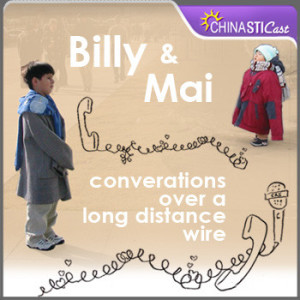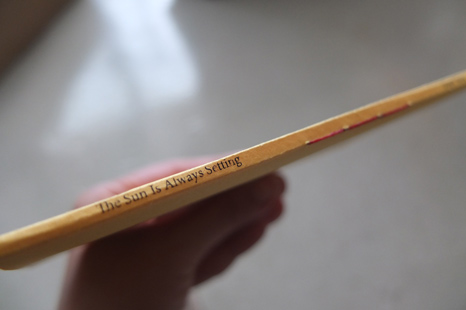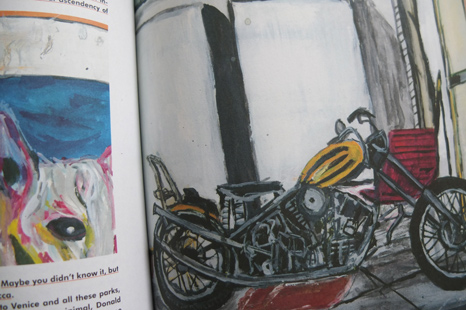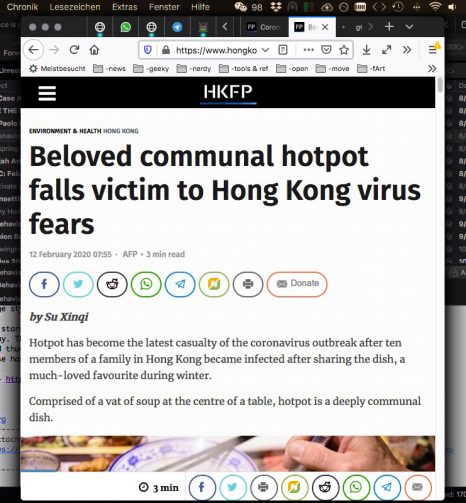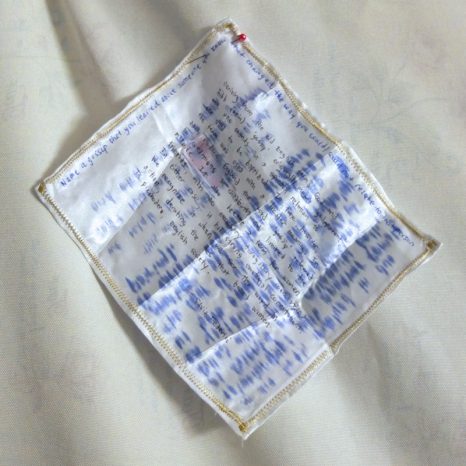🐢 點iwishicoulddescribeittoyoubetter發起的時候參與者haxi,今天GOODBYE過去時考古還能挖出來這樣的一個回憶 💓!05年在北京我第一份工作是給國際廣播電台做一系列英文播客。像haxi所說的,「在pre微博、pre微信、pre移动互联网时代,我们还做过这样一个东东。[😎旺柴😎] 」miss erminia,我電腦上有第16期,很想聽一下「💩 OHMYGAWD, I STEPPED IN POO 💩」那期,你有嗎?⋯⋯OHMYGAWD 🎶 GOODBYE 2021,想你們呀~
Posted by 丫 | reply »
epistolary formations (for Ĵ, Ş, Ȼ and Ḅ)
dearest yous,
digital crumbs here in response to those things you said, those things you sent, real material ways and a digital means. ‘i am sorry for the delayed reply’ prefaces so many of these formations, followed mostly by the mental hesitation for apologising too much. though it’s nice to hear ‘no need to apologise’ in response sometimes, it takes a sorry to get there. truly sorry for too many things.
lateness somehow psychologically necessitated a more involved response, if this so-called ‘publicness’ can warrant any more meaningfulness. actually i told Ḅ that what i like most here is the anonymous intimacy of passerby in public, because being an outmoded place, it’s hidden in plain sight, Emily Dickinson style. there was a period when i wrote little notes and left them in random places, too, and i found one a few years ago that didn’t get distributed, so sent it to Ẳ in the post along with a bunch of other random things, but i think the clutter of it all overwhelmed her, so there was not much conversation about it afterwards. at the time, her son could just fit the quarter-sized sample jacket i made in fashion school.
so many things need explaining.
and your faith astounds me sometimes. but i guess we still make (it) work. it’s perhaps not so dissimilar——nudity in public, intimacies for those who were never keen at p.d.a., the weaning separation from one’s body that is called a work.
Art is insufficient to narrate the inhumanity of history, because it is insufficient to explain it. Disaster is either explained by means of psychology, or the savagery of society is described as if it were a supernatural event; fascism is presented ‘as the machination of rackets outside society, not as the coming-to-itself of society as such.’
-from The Orpheus Double Bind: What Can Writing Save?, Nurdan Gürbilek
and what would you say to those that don’t watch films, don’t really read books, don’t dance? aren’t they terrible, those people, how are you going to explain it to them? how are you going to wish for them the thing that changed you and you don’t regret it not one bit, except all the times you fail to explain it to your stern mother or that person in power that you wanted to impress. you’re sorry.
Ş, i like the digitised irony that your rooms reminded me of playing Hitchhiker’s Guide to the Galaxy, or growing up choosing my own adventure——though you don’t say ‘you’. but something like she says, it wasn’t birds but paper speaking——your real, material and actual post, Ş, so carefully bound by hand and sent to me across the Pacific just as you said you would, when most people don’t. and with that I have to tell you, unapologetically sorry, that I haven’t forgotten what I said I would send to you. it’s not ready yet, hopefully soon.
“Time the Great Healer (live at the Boston Museum of Fine Arts, 5 September 2006)”, Cat Power
though today i put off work to deal with a number of personal matters. and really that is an irony as well, as if they were separate in these realms, you know what i mean, but again it’s something about still learning to explain after all this time, i have to reiterate myself and you to yous again and again, because you weren’t listening and in my anger i don’t hear myself. maybe you’ll say i have to listen more in order to be heard. maybe.
i like that the package from Ĵ, one of the most dedicated in believing the romance of ‘art’ and ‘post’ all these years, came this time not directly from you but by the smooth spaces of guanxi through the editorial office of a magazine based in Spain. i like that you once fleetingly included me in one issue, and still hope that we’ll have that chance for a two-day dialogue over sidewalk beers some day.
“ピンクブッチ Pink Butch (ラララ Lalala)”, マジカル・パワー・マコ Magical Power Mako
i like that an e-mail from Ȼ seems so anachronistic amidst all of our other conversations online, that the tone differs by that very fact and that you’ve encouraged me thus to write poems in Chinese, like Ɀ also showed me, so simply, how line breaks make all the difference.
did i show you the poem he helped me to break?
每當你不在(身邊),我念及你的時候
總有許多的話,想要對你說
距離慢慢縮短,空間卻變得
越來越厚重
文字難以承載的那些話題
總與天氣有關
一種中間狀態,它從來不明白你
或者是我
我們侃侃而談
談論愛
卻總是不夠
— from the 視覺博物誌 Visual Diary Archive project “其人,其事:何京蕴 Just People, Just Timing: Anouchka”
and for Ḅ, who joined us most recently and 那麼有耐心 accompanied me 陪著我 so patiently on the 坐今天的山車 roller coaster of today:
Posted by 丫 | reply »
Textual Notes PWSSSRFS…
(there are reasons to think about my body and hygiene these days)
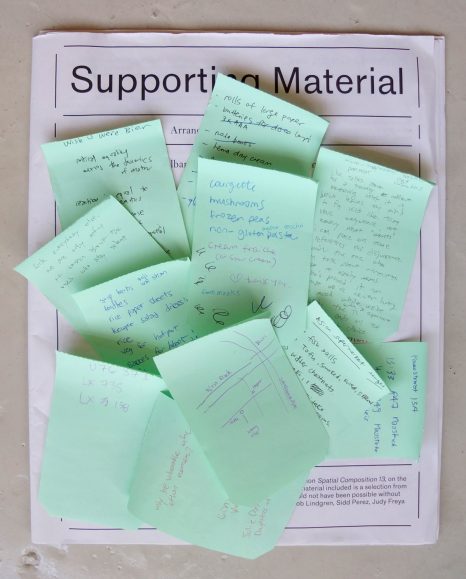
— Notes taken while on residency with Amy Suo WU at Motel Spatie; Arnhem Presikhaaf, 2020 January-February
In the time of that sojourn, a surface wound that stayed the entire time, irritated, flaming and hardened so much that it was narrated from being the oddity of a pimple on my hand to the paranoia of a wart-like abscess. It accompanied me during our conversations like a replacement for the biting of nails which had accompanied me since childhood, the extra psychosomatic conversation with myself to harmonise and discord with any other conversations going on in the room. And we spoke about intersectionality.
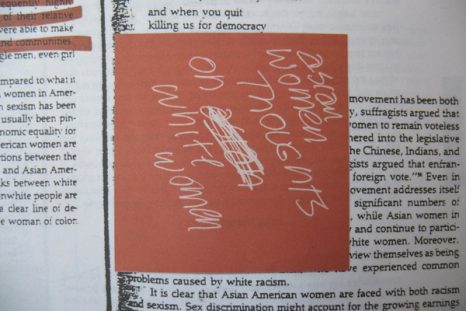
— from “Worlds in Collision: Multicultural Art History (Selection)” by Carlos VILLA, from Supporting Material by Celine CONDORELLI
I picked at it, making it bleed and scab over more than once, wondering if this would be the lifelong marker with which to remember this time. Other people get tattoos for such occasions, but somehow for me bruises, scars and mosquito bites were always enough. Sometimes I liked to think about the tiniest bit of spittle from an insect you never saw being smuggled transnationally, at peak seasons such that your body could carry two nationalities of mosquito saliva at the same time, recognisably different by the radius of red and degree of itch.
It was only a surface. But as my skin-scoring became manic, I remembered one of the first meals we shared together, when we were happy to find a few pairs of disposable chopsticks in the otherwise fork-and-knife-loaded space. A bit too brashly did I rip apart the two sticks and rub their ends together so as to smooth the rough edges in the way that we had learned, and somehow a little bamboo splinter had lodged itself into the meat between the thumb and forefinger of my right hand. This is the pressure point you are supposed to massage in order to release anxieties, and so it was that this residency——initially planned as an artistic labour——unfolded into my body subversively with a small army of histamines hardening a point known as 合谷 hégŭ, or LI-4. Like a pain to help release pain.
I had been telling everyone that it had been such a difficult year for me, or for most people in my context, rather, but now, when I had limited this sabbatical purposefully to run back into the fire, that heat seemed to flake away into something much more quietly insurrectionary, like the last hibernation before the end of the world. What were we gathering amidst these stories and meetings, me picking self-consciously at a surface wound on the back of my hand and scheming in those vague ways afforded by poetry? Would it be possible to be productive about this care in letting go, somewhere in between concern and a manic extraction of the conversation one has with oneself, parasiting off of the glimmers of knowledge and joy and jealousy of these people around me. So many intensities.
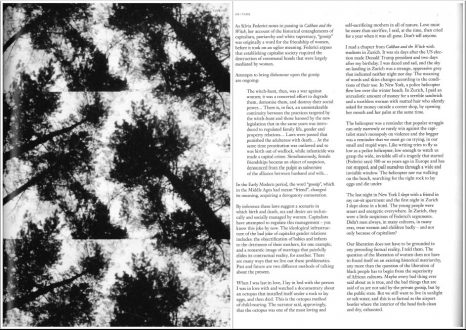
— “Witch-hunt: gossip has always been a secret language of friendship and resistance between women”, Hannah BLACK
In many parts of the world, women have historically been seen as the weaver of memory——those who keep alive the voices of the past and the histories of the communities, who transmit them to the future generations and, in so doing, create a collective identity and profound sense of cohesion. There are also those who hand down acquired knowledges and wisdoms——concerning medical remedies, the problems of the heart, and the understanding of human behaviour, starting with that of men. Labelling all this production of knowledge ‘gossip’ is part of the degradation of women——it is a continuation of the demonologist’s construction of the stereotypical women as prone to malignity, envious of other people’s wealth and power, and ready to lend an ear to the Devil. It is in this way that women have been silenced and to this day excluded from many places where decisions are taken, deprived of the possibility of defining their own experiences, and forced to cope with men’s misogynous or ldealised portraits of them. But we are regaining our knowledge. As a woman recently put it in a meeting on the meaning of witchcraft, the magic is: “We know that we know”.
— Witches, Witching-hunting and Women, Silvia FEDERICI
Among you, it becomes difficult to compare all that has been said to all that has not been said. All of these conversations. And these words are a conversation with those conversations, if not simply out of a question of translation but out of the need to make space for myself in this constellation of you(s) and me(s). To ascertain, like that book I took from your bookshelf: Feelings are Facts. We(s) would need to meditate through hours and hours of these discourses in order to sift though the medley of feelings that make up this moment, and that is a fact, too. Yes, as the witches say, “We know that we know“.
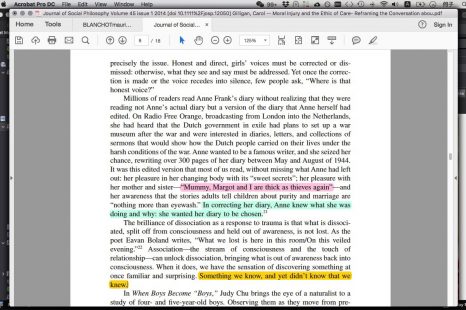
— “Moral Injury and the Ethic of Care: Reframing the Conversation about Differences”, Carol GILLIGAN
And maybe I know too many things. My head is filled with all sorts of banalities like the facial expressions of strangers and the taste of your favourite Grüner Veltliner and the prick of winter mosquitoes. Like the approximate sojourn of a piece of shit that appeared a few days after I arrived. It was the lack of anyone’s care to remove it from the narrow path between our residency room and the project space, making it such that you took the long route around every time, while I forged ahead to play hopscotch. I had the forethought that this dog I never saw had left the natural wastes of its circulating body just like the mosquitoes, and perhaps I should bring other contraband back this time as another memento of my stay. But an uncared-for poop was just a parallel temporary visitor like us to this space motel, and the day before I departed, what were now like hardened coal nubs finally blew away with that strange storm of not very much rain. Perhaps its winds were so great it blew its own rain away, a storm having a frightening conversation with itself. Its utterances came out like screeches and gales that shook the glass of our cove. From inside, we lifted our heads up in awe, and when we went outside we walked at strange angles with our heads down, pretending not to overhear. Buddha was also blown violently away that day, falling off of a neighbour’s balcony and left as an Asian corpse shattered in the white neighbourhood. In the beginning I kept thinking we would have been a strange sight here, our little crew, but actually there was nobody around most of the time, and we were left to play on our own like children at the slumber party. We stole time that way, turning their money and our own productivity into a space for taking care. Even so, I walked on that shit at least once, but you took time, and we cleaned up our tracks together. Self-quarantine, if you want to call it——I gained ten kilogrammes, too——but something else feels lighter because I know we had taken it on together. This takes space and so it was that ‘project ruimte’ was exactly that, not as the space for projects but a project to make space, as a fact of feelings between us——to read together with long pauses in between, to write letters from near and far, and to eat and resist the fallen communality of a shared meal out of one bowl. To be together and trust in someone else’s voice to guide when our eyes are closed.
I don’t know yet how to bring this space into visibility. And maybe it doesn’t have to, except as mischievous glances and giggles between those of us who know, and even if you don’t see us you will feel the smiles in our voices in that space behind your ears and in front of your neck——a tingling somewhere between an itch and a tickle to make chords and discords in you, too. Take care.
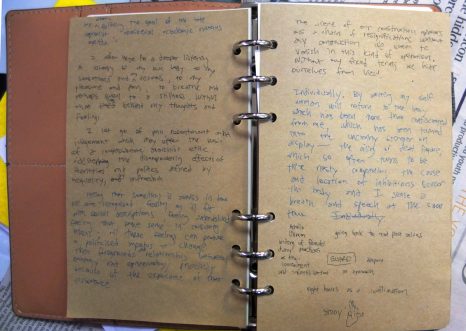
— Altered quotations and notes taken from the afwasdoekje reading group, PWSSSRFS No. 1, 2020 January 25
Posted by 丫 | reply »
「尋找問候」系列第三章(wish you were here)
倫敦 london – 英属哥伦比亚省列治民市 richmond, british columbia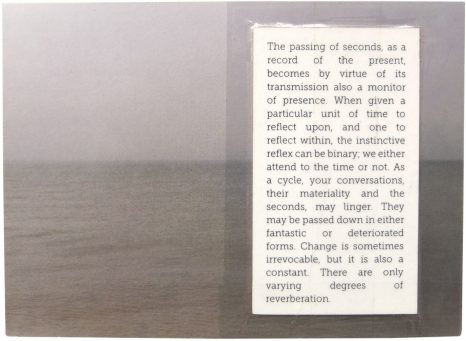
dearest,
that’s heavy. hope that it is not a reflection of your current state.
is it?
but i discovered this today, which whether or not you like the music, you may begin to love simply by the way it is described:
Talked to you on the phone the other day——WhatsApp voice call——and I noticed the dissecting and unsettling silence fading in between each spoken word, like someone holding the breath or stopping time. Or a tap closed between each filling of a glass. It was a clean, cleansed, silence; one purified by the dullness of calculation, of automation, of regulation and optimisation.
I remember the feeling of talking with friends via landline connection——it felt like a direct channel opened up between our ears and tongues, an airiness of circulation. I could hear the other person breathing and the slight static noise of electricity hardwiring us. Now I don’t hear the other person’s breath anymore——the algorithmic sound detection for controlling the threshold of the microphone transmission seems to not register breath as a signal deemed necessary for communication.
![]()
![]()
…
日惹 yogjakarta – 墨西哥城 mexico city
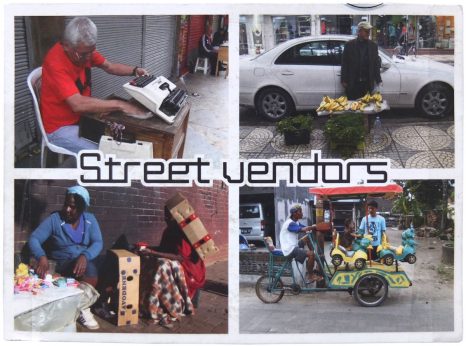

wonder if you remember that we had said we would go on holiday together last year.
wonder how you and your child are doing.
wonder if you remember that i had wanted to make strange models for your movie.
wonder if you remember that i haven’t written back to your e-mail.

can a contemporary condition become one’s psychological impairment, the wonderous thing, like her blank auto-replies, or trying to imitate the words of a great master:
⋯⋯很想对着那些无忧无虑的娇花倩草哭上一场。可她的眼泪已经被巨大的悲哀征服了,她这才明白绝望者是没有泪水的。
⋯⋯All she wanted to do was cry into those graceful and carefree petals, into the beautiful grass, but any tears in her had already been conquered by tremendous sorrow, and she finally understood why those in utter despair shed no tears.
— 遲子建 CHI Zijian,“亲亲土豆 Potato Kisses”
Posted by 丫 | reply »KUNCI = keys, soul, rainy season, chicken katsu
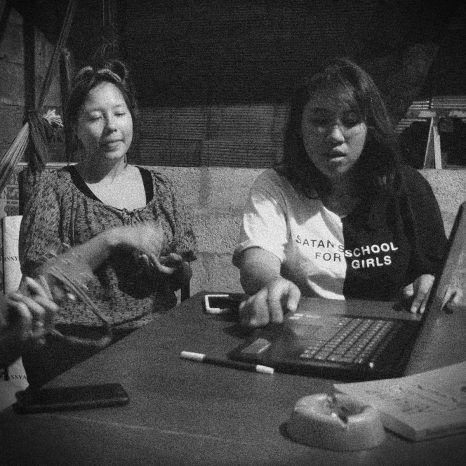
Recorded 15 December 2018 around 8 pm at KUNCI Cultural Studies Center, Yogyakarta, during the rainy season
with sounds from // Monika AJAS, Ying QUE, Alicia KEYS, Meghan TRAINOR featuring John LEGEND, SYAFIUTADINA, 何穎雅 Elaine W. HO
Posted by 丫 | reply »
但願為您描述得更好ASMR
「但願為您描述得更好」ASMR——在糟糕的日子里,讓您舒服一下
雉尾電台,2018年4月20日,凌晨1-兩點
archived recording, originally broadcast on Pheasantail Radio, 20 April 2018, 1 – 2 am UTC +08
featuring selections from:
🎧 《A User’s Guide to Demanding the Impossible》 by the Laboratory of Insurrectionary Imagination
🎧 「Coping Mechanism: The Care of Self and the Politics of Listening in Art and the ASMR Community」by Ashley Lee WONG
🎧 「RECEIVE UNEXPECTED MONEY IN 1 DAY | Subliminal To Attract Money」
nusantao and a trans-pacific dialogue with Chris Kraus
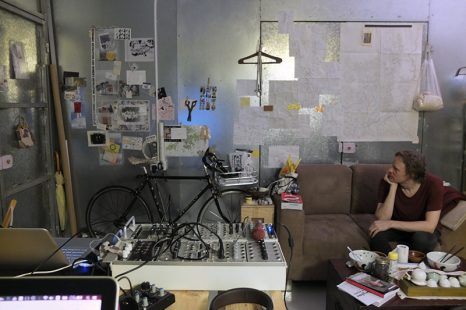
dirty south.
In a hypothesis developed by Wilhelm Solheim, the Nusantao Maritime Trading and Communication Network (NMTCN) is a trade and communication network that first appeared in the Asia-Pacific region during its Neolithic age, or beginning roughly around 5000 BC. “Nusantao” is an artificial term coined by Solheim, derived from the Austronesian root words nusa “south” and tao “man, people”.
— filed under “Nusantao”, Wikipedia
the spread in many directions as “a kind of excuse to party, right“, T. commented, and W. agreed, even though she was disappointed that nobody was listening, and even though she wanted to find some theoretical right to party, like a Brechtian sausage.
— 恩斯特·布洛赫
There would not have been a French Revolution, as Marx stated, without the heroic illusions that natural law engendered. Of course, they did not become real, and what did become real of them, the free market of the bourgeoisie, is not at all that which was dreamed of, though wished for, hoped, demanded, as utopia. Thus now, if a world were to emerge that is hindered for apparent reasons, but that is entirely possible, one could say, it is astonishing that it is not——if such a world, in which hunger and immediate wants were eliminated, entirely in contrast to death, if this world would finally just “be allowed to breathe” and were set free, there would not only be platitudes that would come out at the end and gray prose and a complete lack of prospects and perspectives in regard to existence here and over there, but there would also be freedom from earning instead of freedom to earn, and this would provide some space for such richly prospective doubt and the decisive incentive toward utopia that is the meaning of Brecht’s short sentence, “Something’s missing.” This sentence, which is in Mahagonny, is one of the most profound sentences that Brecht ever wrote, and it is in two words. What is this “something”? If it is not allowed to be cast in a picture, then I shall portray it as in the process of being (seiend). But one should not be allowed to eliminate it as if it really did not exist so that one could say the following about it: “It’s about the sausage.” Therefore, if all this is correct, I believe utopia cannot be removed from the world in spite of everything, and even the technological, which must definitely emerge and will be in the great realm of the utopian, will form only small sectors. That is a geometrical picture, which does not have any place here, but another picture can be found in the old peasant saying, there is no dance before the meal. People must first fill their stomachs, and then they can dance.
— Ernst Bloch
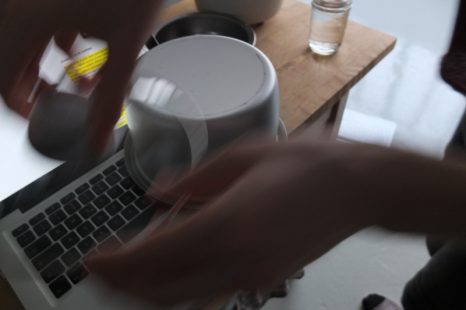
W.’s trauma of not being heard was a structural problem as much as a genetic defect, more recently amplified by contemporary notions of #fomo, post-maturity and the simple fear of being lost and forgotten and useful to no one.
S. was then of an age where she thought about age at least eight times a day. Having spent parts of her life in New York and LA, she knew where she was “from” didn’t much matter. When she was a student at Wellington High School, S. recalled being told by the head English teacher, a salt-and-pepper-haired man in baggy black-and-white tweeds who’d published critical essays on D.H. Lawrence, that because of her emigration from the US at such a formative age, she had no nationality and therefore, despite her interest in literature, could not be a writer [see further at 版本 version 3.0]. Which is to say, S. had lived through various eras including the demise of nationalism.
— from Absolute Love, by Chris Kraus (Scary Topiary Press, 2016)
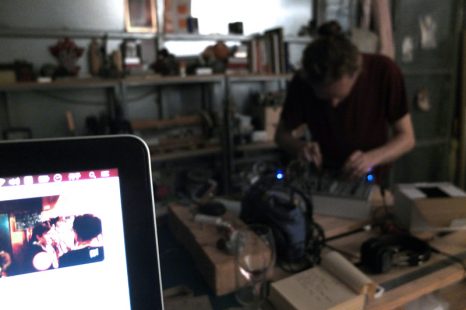
Unfortunately nationalisms have not really died if we are still looking for these genealogies of belonging, southern girl, and you empathised with O.’s alienation even though he talked about love and hate in a way that made you hate him. later, W. made a transnational gift of O.’s art object produced by W.’s semi-anonymous collective, her shy prefaces leading T. to make fun of W. because of her need to make a “finished product”. These are all various forms of trade and transaction, not so dissimilar from the way that cultures and identities and forms of belonging happen over time, across oceans. so while W. becomes a businesswoman she finally realises that her roots are not merely ethnic as much as gender-specific and class-based, contaminated, kind of like ‘dirty south’.
— “Southern Girl” by Rahzel feat. Erykah Badu, from the 1999 album Make the Music 2000
Posted by 丫 | reply »inadvertent soundtracks for inversion eyes
put your inversion eyes back on, proximity as the coming towards of embodiment, she says “the politics of location”. speaking as:
Ivo Kohler and Theodor Erismann, 1950
playlist:
__”Computer Eyes”, Jakob Boeskov/Timothy DeWit/Matthew Morandi, from The Wire Tapper 34
__”Golden Hours”, Brian Eno, from the album Another Green World
__”Pure”, Blackbird Blackbird, from the album Summer Heart
__”Tigers”, Christy & Emily
__”Talking History”, Xiao Hong & Xiao Xiao Hong, from the Dada Damage Compilation
__”Sullen Ground”, Mount Kimbie, from the album Cold Spring Fault Less Youth
__”Went Missing”, Nils Frahm, from the album Spaces
__”What Time is Love”, The KLF
__”Token Eastern Song”, Nirvana, from disc 4 of The Chosen Rejects: Live Rarities
__”Little Dreamer”, Future Islands, from the album Wave Like Home
__”Wait For Me”, 張曼玉 Maggie Cheung, from the Clean original soundtrack
